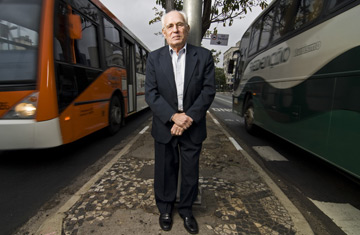
Today, when American farmers are enjoying the benefits of ethanol subsidies, it's easy to forget that the idea of fueling an economy through a plant rather than petroleum was once a fringe notion. But José Goldemberg remembers. In 1975 his native Brazil was buffeted by the international oil shock. As much out of desperation as anything else, the Brazilian government launched a crash program to develop a viable alternative to gasoline. Three years later Goldemberg, then a nuclear physicist at the University of São Paulo, co-authored a paper in the journal Science that showed the world what Brazil had discovered: that it's both possible and profitable to harvest a clean and renewable fuel, ethanol, from the country's abundant sugarcane.
"That [paper] was my contribution," says the 79-year-old Goldemberg, who today sits on the board of the Sustainable Energy Institute in Washington. "I pointed out that sugarcane was not just a product but a fuel — and not a fossil fuel. What I did was make people feel assured that this was the way to go."
Brazil has continued down that path. Today the country is the global pioneer in biofuels. Brazilian gasoline contains at least 25% ethanol, and two-thirds of all new cars produced there are flex-fuel models that run on anything from conventional gas to pure ethanol. Not only has the shift reduced air pollution in Brazil's major cities — ethanol runs much cleaner than gasoline — but biofuels help reduce greenhouse-gas emissions as well. Burning ethanol releases carbon dioxide into the atmosphere, but growing the plants absorbs a comparable amount of the gas. Ethanol has reduced the country's carbon emissions by 46.6 million tons annually — 20% of its total carbon footprint.
Biofuels are far from ideal. If the industry expands too quickly — a real risk, given the current boom — it could worsen deforestation and erase the environmental and social gains biofuels offer. Too much of a good thing can be deadly, as Goldemberg knows. After helping to run the 1992 Earth Summit in Rio as the country's interim Environment Minister, Goldemberg played an integral role in convincing Brazil to abandon its efforts to build atomic weapons. This concern about humanity's destructive potential continues to inform his environmental work. "People are becoming aware that we have become an ecological force," he says. "We've realized that we represent a real threat, and therefore people will tend to be more careful."